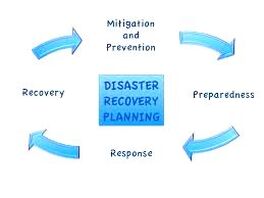Archives
May 2020
Categories
All
|
Back to Blog

Current events dictate that it would be wise for every family to have a disaster recovery plan. Stuff happens all the time. Some of it not of your own creation. Whatever its source, it impacts you and forces you to regroup. What are you going to do when disaster strikes? How are you going to recover from it? One of the important aspects of financial capability is Protecting. You have worked hard to make gains to achieve financial well-being.
Resilience is an important part of financial well-being. As any world-champion prizefighter legendarily says, “it not just how hard a punch you threw; but also how hard a punch you took?” that matters. Being prepared and not just depending on luck or largesse to bail you out of a tight spot is a Money Smart Lifestyle. In the fight that is working-class financial life in 21st century America, a properly resourced emergency fund will help you absorb and recover from life's inevitable shocks. Your emergency fund can contain more than just cash. Prepping is a movement. The focus of this post is narrow. It is an overview discussion of food stores as a portion of an emergency fund, not a preppers guide. Prepper or not, it is prudent for every family to have a food security plan that anticipates disruptions. Also when properly integrated, a food store can become a cash flow resource. Let’s look at some basics. Types of disruptions where everybody is affected by the same catastrophe. You should be able to sustain your family for a minimum of 3-7 days in the event of a catastrophic event.
There is a chronic lack of cash when your income is routinely reduced through employment practices such as temporary layoffs, reduced hours, uneven or seasonal schedules, and lost hours due to unpaid sick or disability leave. Using a food store as part of your meal plan can reduce stress and the need for cash during such times. Types of disruptions where society collapses for 90+ days by a zombie apocalypse or whatever is beyond the scope of this blogpost. Besides, you won't be using Money anyway, but your food stores may have some barter value. Good luck. Here are some things to do to start prepping for disruptions. You don’t try to swallow the elephant in one bite, so to speak.
Make sure the plan works by rotating your stores regularly. Rehearse emergency situations before the emergency arises. These dry runs can be made into fun family activities. They will let you see where your plan needs tweaks. Can you really make 7 days of interesting meals using only your food store? Don’t wait until you have to do it to find out if you can.
0 Comments
Read More
Your comment will be posted after it is approved.
Leave a Reply. |
MONEYSMARTLIFE.ORG EMPOWERING SUSTAINABLE FINANCIAL WELL-BEING IN WORKING CLASS FAMILIES

 RSS Feed
RSS Feed

